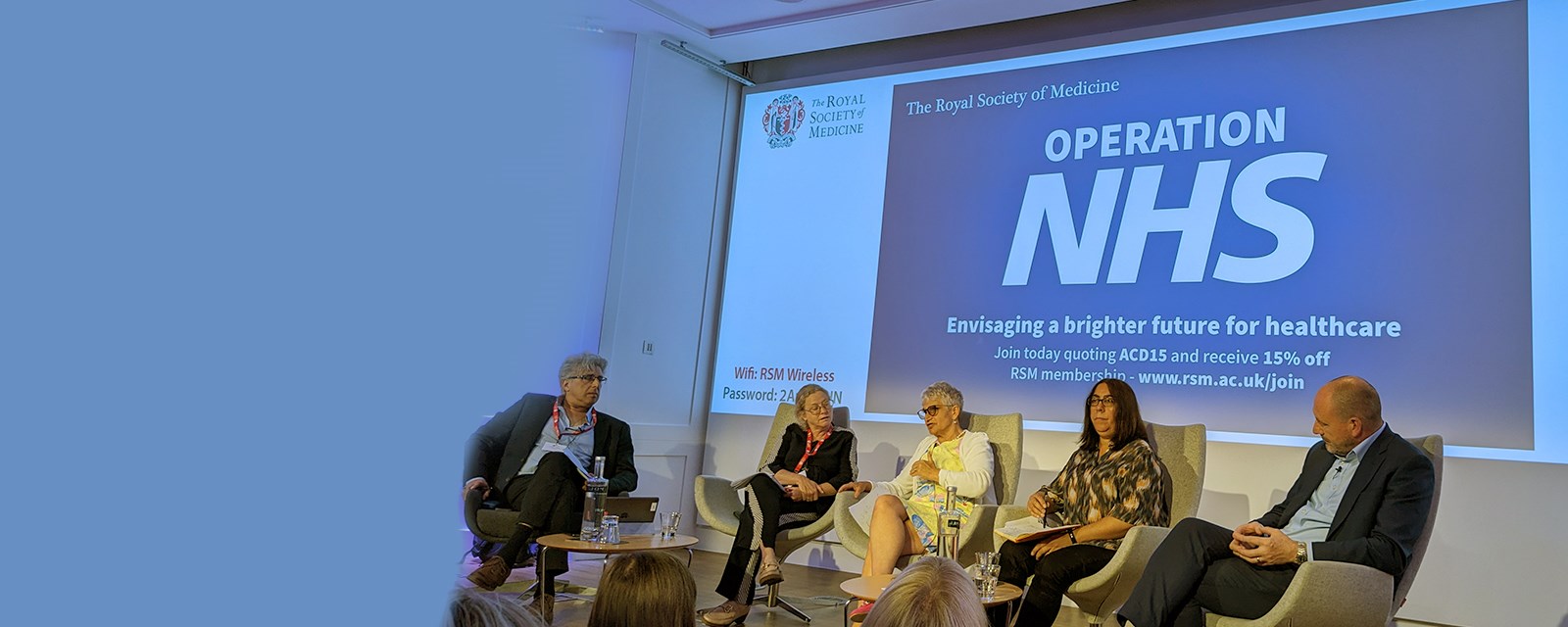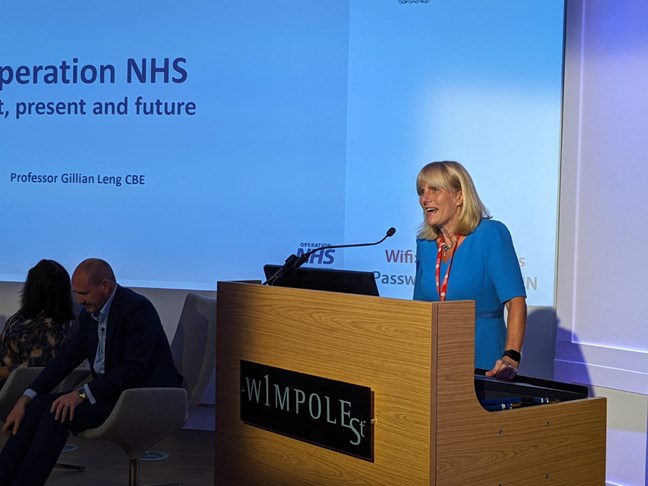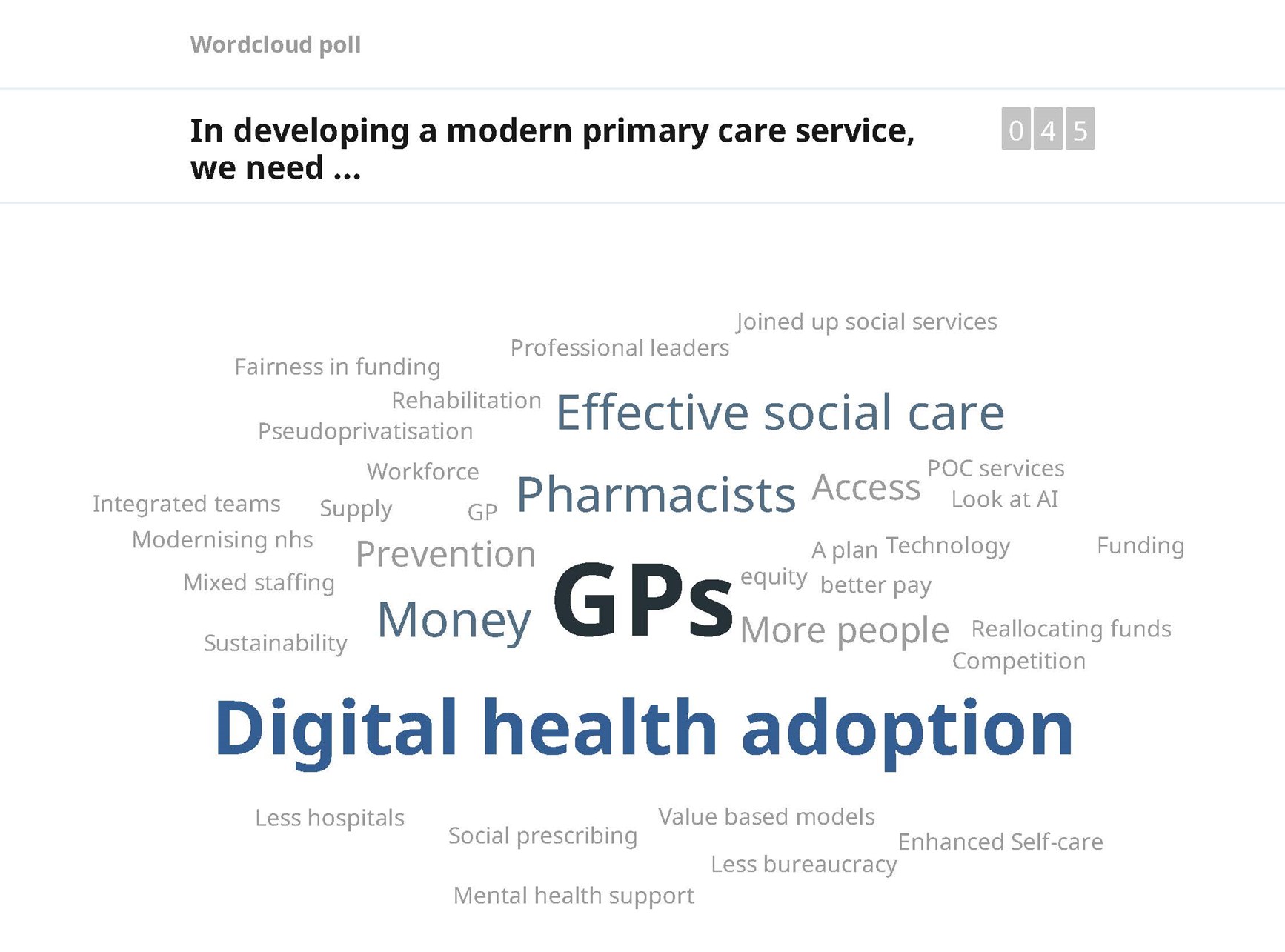
The RSM debates a brighter future for the NHS
Clinicians, healthcare professionals, researchers, school students and charity sector representatives gathered at the Royal Society of Medicine on Tuesday 20 June 2023 to discuss the key strategic changes needed to secure a brighter future for the UK’s National Health Service.
Opening the event, Professor Gill Leng CBE, Dean of Education at the RSM, set out the key challenge facing the NHS; the ever-increasing spending on health. “So much more is possible today than when the service launched in 1948,” she said. “And because we can do more, it inevitably costs more,” she added, offering examples such as genomic medicine, personalised care and cancer treatments as contributors to the increasing cost of the NHS as a tax-funded service, free at the point of use.
With the health spending trajectory going up, do we need a different agreement on the healthcare offer in the UK, Professor Leng asked, so that people know what they can expect – and what they can’t expect?

Professor Gill Leng CBE, RSM Dean of Education, opens Operation NHS: Envisaging a brighter futuer for healthcare
Polling at the start of the event revealed what the audience considered to be the three most important areas for the NHS to focus on over the next 5 to 10 years: Workforce; primary and community care; and funding.
Chairing the ensuing discussions, Dr Kamran Abbasi, Editor in Chief of The BMJ and the Journal of the Royal Society of Medicine, introduced panellists Professor Anita Charlesworth, Director of Research and the REAL Centre at The Health Foundation; Professor Dame Clare Gerada, Co-Chair of the NHS Assembly and President of the Royal College of General Practitioners; Ms Louise Ansari, Chief Executive of Healthwatch England; and Dr Mark Davies, Chief Health Officer at IBM and Deputy Chair of The BMJ.
Addressing the issue of funding, Professor Charlesworth drew on evidence from the Organisation for Economic Co-operation and Development, the World Bank and the Commonwealth Fund. She highlighted the pros and cons of a tax-funded versus social insurance-funded system. “While there are very high-performing healthcare systems that are based on a social insurance model”, she said, “if the UK was to transition it would be a very big step.”
“We would have a one-off cost, we'd have to put more money in to run the system that wasn't going into patient care and that feels quite a hard sell to the public,” she said. If we were to find some money for healthcare at the moment, she went on to ask, would we want to put it into the administration?
Members of the panel agreed with Professor Charlesworth that looking at funding models is probably a displacement activity, deflecting us from addressing the really difficult questions. “What matters for a country,” she said, “is much less how you fund it. It’s how well you run the system that you’ve got.”
A member of the audience who works as a GP commented: “In terms of the funding, it seems really important to look outside the NHS. We’re using the NHS as a very expensive sticking plaster for failures in housing, social care and education and the public health grant has been cut. If we ignore all those, I don’t think we’re going to make progress.”
Dame Clare said that while she didn’t believe that ‘we should morally be putting more money into healthcare’ other than inflationary costs, the balance of funding within the NHS needed to be tilted towards primary and community care.
She went on to describe three major shifts that have to happen ‘if we’re going to have a sustainable health system.’ The first is to address prevention in primary, secondary and tertiary care to enable people to live in a healthier way and narrow the gap in life expectancy between the richest and the poorest.
The second shift is personalisation, said Dame Clare, not just in terms of medicines but in allowing patients choice. “It’s about allowing nothing about us, without us It’s allowing patients to be empowered, as we did during Covid, to be masters of their own health, rather than passive bystanders.”
The third major shift said Dame Clare, was a shift towards community and primary care. “We've got to stop having this artificial division between hospitals and primary care and start to move the system towards delivering better primary and community care.”

Results from an audience poll during the event
Talking about the need for a public discussion about the decisions that need to be made about the future of the health service, Ms Ansari said: “We do need an adult conversation with people to say: ‘where should the investment go? Are you going to be happy to move care out of hospitals, because we should have less acute medicine, and are you going to be happy to move it back into community and primary and prevention?”
Going on to talk about the feedback from people all over the country that she and her colleagues at Health Watch England receive about access to health services, Ms Ansari outlined how problems surrounding access to GP services were exacerbating health inequalities.
Describing recent Health Watch England research on the cost of living and how it is stopping people from accessing healthcare, she described how 10% of respondents reported that they would not contact their GP because of the cost of a call on their pay-as-you-go mobile. Neither could they afford to pay for the cost of their prescriptions or over-the-counter medicines.
On the theme of equity of access, and speaking from the audience, a representative from the Thomas Pocklington Trust, a sight loss charity, spoke of her experience of living with sight loss and co-morbidities and the access issues she encounters. “Every time I go to the hospital, no-one knows how to guide me. I get pushed here, there and everywhere.”
Turning to demand and workforce capacity, Ms Ansari said that people understand that the workforce is under a huge amount of pressure. “On the whole, people are open-minded about who they see, but quite often people think they need a referral and at the moment it’s only the GP that can do that. If nurses, physiotherapists and other associated health professionals could make referrals that would solve part of the problem.”
Professor Charlesworth was asked why demand has gone up so much since before the pandemic and explained that the big problem lay not with demand, but with capacity. “We’ve had a diverging problem of demand rising, largely because we’ve got an ageing population, and we weren’t keeping pace with capacity. Overlay the pandemic on top of that, with bed occupancy rates over 90% and GP numbers falling, and it created a perfect storm. The system is hanging on by its fingertips.”
Digital and technology featured highly throughout the debate and Dr Davies took the opportunity to reframe the conversation around digitally enabled transformation. “There’s a big difference between just taking a piece of technology and throwing it into a problem. Frankly, often when you do that all you’ll achieve is to surface the problem and make it more visible. Applying digital capability to digitally do what we did before is an exercise in redesign.”
He went on to talk of some of the major transformations that could make a big difference to the NHS, the first being the interface between the NHS system and the public. For many years, said Dr Davies, people have talked of patients and informal carers as being the most valuable resource in healthcare, and probably the most underused. “With the advent of one of the most exciting medical devices that I’ve seen in my career – the mobile phone – we have a genuine opportunity to turn that rhetoric into a reality,” he said.
There are also significant opportunities for the digital transformation of providers, specifically in the non-clinical aspects of healthcare such as resource management, asset management, supply chain and estates management, added Dr Davies.
He then went on to talk about the significant level of investment global companies put into the retention, wellbeing and experience of their workforce. “70% of the cost of the NHS is on our workforce,” he said. “They are probably one of the most important determinants of the experience and outcomes of our patients and by and large, in terms of their welfare, we just frankly ignore it.”
There are, he said, important digital solutions to help support the health and wellbeing of the NHS workforce, using user-centred design, that could provide a frictionless experience of work. “It’s about time we drew down some of that technology to revolutionise the experience of working in the NHS.”
He concluded: “The NHS is a fabulous institution and it’s something we should preserve; but we shouldn’t be pickling it. The expectation and the experience and the opportunities have changed since 1948 and we need to be brave enough to have the redesign conversation along the lines that we’ve been talking about tonight.”
Wrapping up the two-hour event, Professor Leng said: “There’s lots we need to do and it’s good to know that digital does potentially give us some solutions. However, transformation will need capacity, resources, time and fantastic leadership and we have to invest in the workforce. It’s people who will make change happen.”
